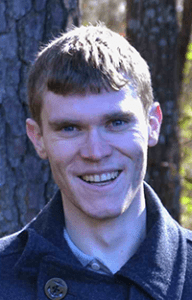For Immediate Release
Tuesday, October 16, 2018
6:10 p.m. U.S. Pacific Time
Media Contact:
Ann Klinck
301.634.7342
press@ashg.org
Findings Reported at ASHG 2018 Annual Meeting

(Courtesy Mr. Kosmicki)
SAN DIEGO, Calif. – In the largest genetic sequencing study of autism spectrum disorder (ASD) to date, researchers have identified 102 genes associated with ASD, and report significant progress toward teasing apart the genes associated with ASD from those associated with intellectual disability and developmental delay, conditions between which there is often overlap. The findings were presented at the American Society of Human Genetics 2018 Annual Meeting in San Diego, Calif.
Jack Kosmicki, PhD candidate at Harvard University; Mark J. Daly, PhD, chief of the Analytic and Translational Genetics Unit at Massachusetts General Hospital; and collaborators studied 37,269 genetic samples collected from large research cohorts worldwide.
“With about twice as many samples as any previous studies, we were able to substantially increase the number of genes studied, as well as incorporate recent improvements to the analytical methodology,” said Dr. Daly. “By bringing together data from several existing sources, we hope to create a resource for definitive future analysis of genes associated with ASD.”
Indeed, the larger sample size enabled Mr. Kosmicki and colleagues to increase the number of genes associated with ASD from 65 in 2015 to 102 today. Of these 102 genes, 47 were found to be more strongly associated with intellectual disability and developmental delay than ASD, while 52 were more strongly related to ASD, and three were related to both. Statistically, the genes were identified at a 10 percent false discovery rate.
“Being able to look at other disorders in connection to ASD is significant and valuable for being able to explain the genetics behind the variety of possible outcomes within ASD,” said Mr. Kosmicki.
Looking forward, the researchers believe these findings will help improve scientific understanding of the inheritance and biology of ASD, and the ability to characterize phenotypes into categories within and overlapping with ASD. They hope to connect the results of common- and rare-variant ASD research with those of larger genetic studies of intellectual disability, developmental delay, and psychiatric traits.
Presentation:
Mr. Kosmicki will present this research on Tuesday, October 16, 2018, from 6:10-6:25 p.m. in Hall C, Ground Level, San Diego Convention Center.
Press Availability:
Mr. Kosmicki will be available to discuss this research with interested media on Wednesday, October 17, 2018, from 1-1:45 p.m. in the ASHG 2018 Press Office (Room 22).
Reference:
Kosmicki J et al. (2018 Oct 16). Abstract: Discovery and characterization of 102 genes associated with autism from exome sequencing of 37,269 individuals. Presented at the American Society of Human Genetics 2018 Annual Meeting. San Diego, California.
About the American Society of Human Genetics (ASHG)
Founded in 1948, the American Society of Human Genetics is the primary professional membership organization for human genetics specialists worldwide. Its nearly 8,000 members include researchers, academicians, clinicians, laboratory practice professionals, genetic counselors, nurses, and others with an interest in human genetics. The Society serves scientists, health professionals, and the public by providing forums to: (1) share research results through the ASHG Annual Meeting and in The American Journal of Human Genetics; (2) advance genetic research by advocating for research support; (3) educate current and future genetics professionals, health care providers, advocates, policymakers, educators, students, and the public about all aspects of human genetics; and (4) promote genetic services and support responsible social and scientific policies. For more information, visit: http://wptest.ashg.org.
6120 Executive Blvd, Suite 500 | Rockville, MD 20852 | 301.634.7300 | society@ashg.org | www.ashg.org
Connect with ASHG on Twitter (@GeneticsSociety) | Facebook | LinkedIn
